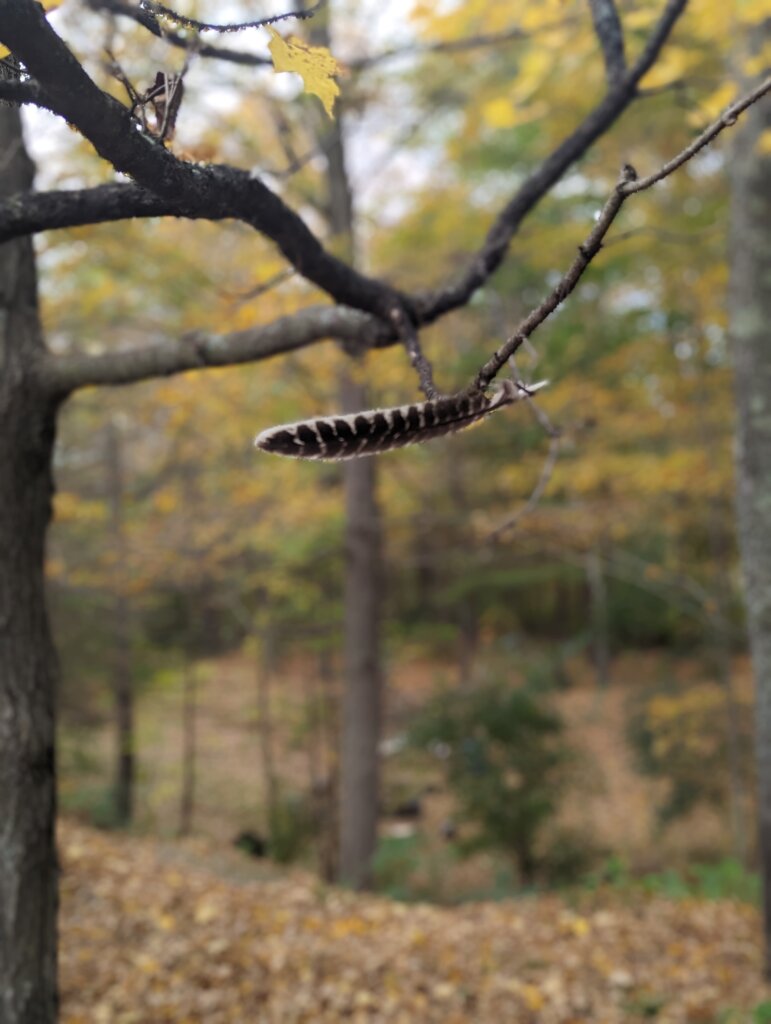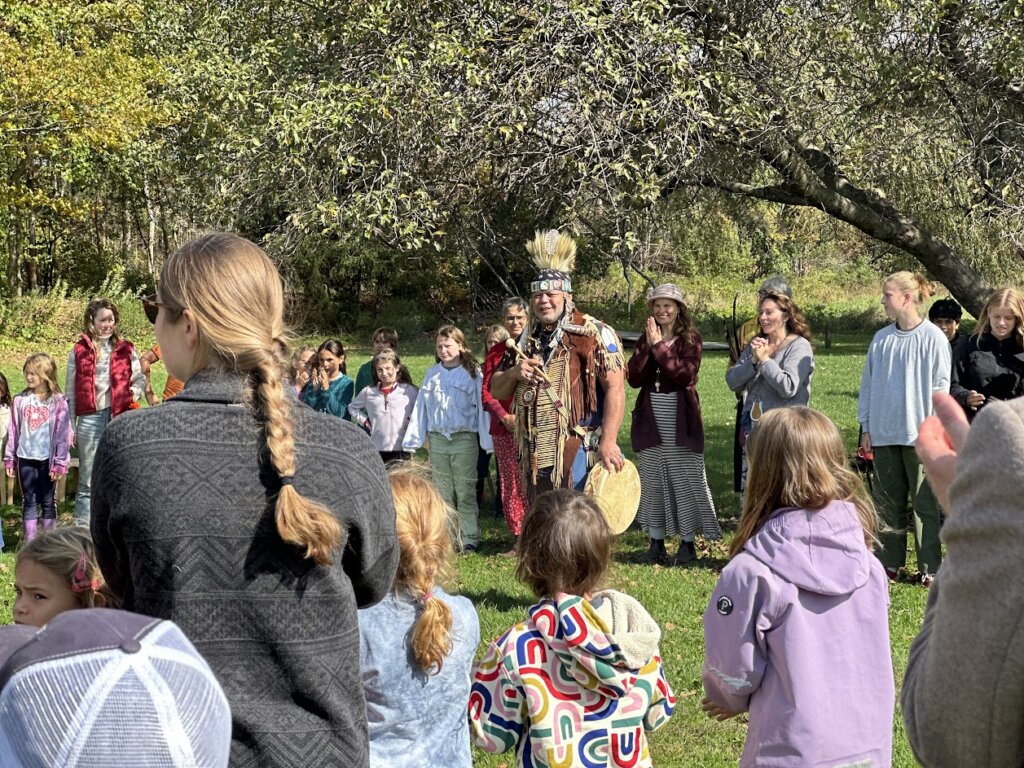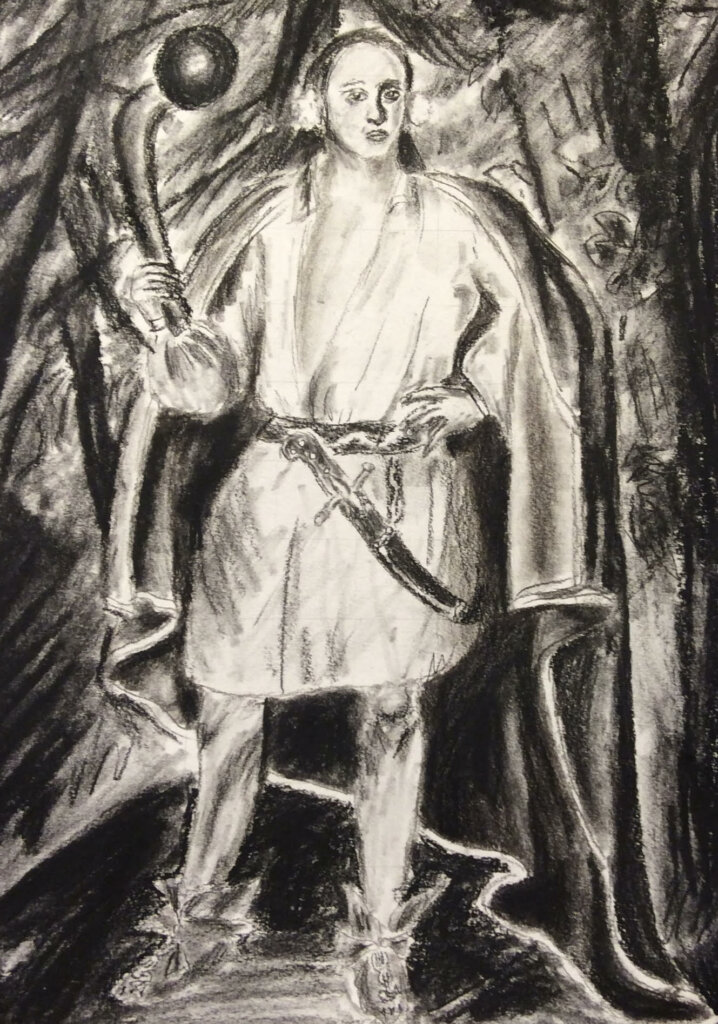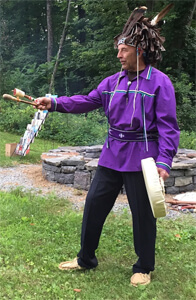Celebrating First Nations Day
As you walk onto the Berkshire Waldorf School campus this week, you’ll see turkey feather flags that students of all ages have hung on branches for First Nations Day, to remember the connection between the people, the land and a spirit of gratitude.

We were honored to welcome members of the Stockbridge-Munsee Band of the Muh-he-con-ne-ok (Mohican Nation) Shawn Stevens and Shannon Chada back to their Homelands from their current-day reservation in Wisconsin, for our school celebration on Tuesday.
Mr. Stevens, also known as Standing Eagle, visited the school for the first time last year. He and Ms. Chada were visibly touched by the turkey feathers—hung knee-high by our youngest students—welcoming them along the path beside the native “sumac forest,” near the Nursery play yard. (Sumac is a treasured Mohican medicine plant.)
Fire Circles – The Original Classroom
This year, Mr. Stevens brought traditional flute and drum songs to Early Childhood students, plus a humorous story. (Kindergartners can tell you the story of “How the Bear Lost Its Tail”—that tricky fox!)

Around the fire with First through Eighth Graders, Mr. Stevens spoke about many aspects of Mohican culture that resonated with topics our students are already learning about, such as how Mohican family groups lived in longhouses, all along the Mahicannituck (Hudson River), and east to the Housatonic. Mr. Stevens described how warriors (“those with big hearts”) went out in their canoes to meet Henry Hudson when he came up the river; at that time, the Muh-he-con-ne-ok had already lived along its banks for thousands of years.
Mr. Stevens discussed how many Nations in our Eastern Woodlands region are relatives, springing from the original Algonquian language group, and had disbursed as far as the Great Lakes and the Carolinas, in order to share available resources. For this reason, he noted, the name Muh-he-con-ne-ok designates “where we’re from” more than “who we are.” It translates approximately to “People of the Great Tidal River.”
What We Learned
Eighth Graders reflected on the ways of thinking that Mr. Stevens discussed in the circle. Here are a few of their takeaways:
“We are all family. We are all the same species, and all come from the same place (Earth). If we could really realize this, we could end war forever.”
“My shirt is made of thread, woven into cloth to keep warm, but it doesn’t mean anything; it’s a thing. Mr. Shawn was saying every thread and bead and stitch of his sash was woven with good intentions and prayers. Imagine how that feels.”
“The tribes of North America, just like the tribes of Africa, aren’t generic, but distinct Nations, with their own languages and cultures and ways of life.”
Onewe! Thank you for teaching us!
Click the button below to see more pictures of the Great Barrington town ceremony and walk on Monday. We are so grateful to see our students carrying the banner for Indigenous Peoples’ Day.
We remember that we are gathering and learning on the sacred, unceded Homeland of the Muh-he-con-ne-ok, the People of the Waters That are Never Still, who are now living and thriving in Wisconsin and the Berkshires.
First Nations Day
We humbly and gratefully acknowledge that our school is learning and gathering in the unceded homelands of the Muhheconeew (Moh-He-Con-Nuck, or Mohican) Nation, who are the indigenous people of this land. Despite the tremendous hardship of being forced from their ancestral home, today their community resides in Wisconsin and is known as the Stockbridge-Munsee Community.
We also honor the elders and land keepers, past and present, of First Nations in the four directions, including Schaghticoke and Lenape to the south, Nipmuc, Wampanoag and Massachuset to the east, Abenaki and Algonquin to the north, and Haudenosaunee to the west.

There are many celebrations and opportunities in the Berkshires this month to learn more about the First Nations of this sacred land.
Indigenous Peoples’ Day in Great Barrington
Drumming, traditional Native American songs, speeches, and a procession culminating in a ceremonial blessing of the Housatonic River will mark the local observance of Indigenous Peoples’ Day in Great Barrington on Monday, October 11. For details and to register, visit www.allianceforaviablefuture.org
First Nations Day at BWS
We’ll light the fires for First Nations Day, Tuesday, October 12, when Abenaki children’s book author, editor and storyteller Joseph Bruchac visits our school to share Northeastern indigenous nations’ stories, songs and drumming. You can find the extensive list of Dr. Bruchac’s books and stories here, and copies of many of them in the Mason and Ramsdell libraries, as well as at Bookloft and other local bookstores.

“We once called this land home, and while forced removal may have physically moved us, our hearts remain.”
-from the Berkshire Museum Exhibit Muh-he-con-ne-ok: People of the waters that are never still
Berkshire Museum
Muh-he-con-ne-ok: The People of the Waters That Are Never Still showcases the story of the Stockbridge-Munsee Communities past, present, and future.
Stockbridge Mission House and Walking Tour
Stockbridge Mission House now hosts a Stockbridge-Munsee Community-curated Mohican Exhibit.
And stroll through Mohican History with this Walking Tour of Main Street, Stockbridge, MA.
Stockbridge-Munsee Archeological Dig
The Mohican Tribal Historic Preservation Office conducted archaeological digs at “Indiantown”—now known as Stockbridge—this summer, to try and locate the 1739 meetinghouse site and the site of the ox roast that George Washington ordered there in honor of Mohican soldiers, in gratitude for their support, at the end of the Revolutionary War.
Sheffield Historical Society – “The Mohican Journey: Homelands, History, and Hope”
The Stockbridge-Munsee Band of Mohicans has worked for decades in research, preservation, education, and governance to promote equality and programs that strengthen their culture and community heritage. Making connections to their ancestral homelands continues to be of sacred value. This exhibit combines a variety of art forms, artifacts, audio and video elements, including content from Dorothy David’s “A Brief History of the Mohican Nation” as well as many personal narratives. Outdoor exhibit on view through Oct 11, weekends 11a-4p and Indigenous Peoples Day, Monday, Oct 11.
First Nations Books
Elder-approved books from the Stockbridge-Munsee Arvid E. Miller Library:
- The Mohicans of Stockbridge by Patrick Frasier
- The Mohican World: 1680-1750 by Shirley W. Dunn
- Stockbridge Past and Present by Electa Jones (contains an oral history of the Mohicans from the mid-1700s)
- Medicine Generations by Misty Cook (medicine plants of the homelands, aka the Berkshires)
- The Arvid E. Miller Library also has great stickers of the Stockbridge-Munsee logo, “Many Trails,” symbolizing endurance, strength and hope.
Forge Foundation
The Forge Foundation, located in the Mohican homeland near Hudson, NY, has launched an indigenous fellowship program to support the work of indigenous artists and activists.
Papscanee Island in the Muhheakantuck (Hudson) River
Read the amazing “land-back” account of how this island in the Hudson River – with a preserve that remains untouched since 1609 – has been returned to its original owners, the Mohican Nation, and you can visit it.
The aim [of this year’s Indigenous Peoples’ Day events in Great Barrington] is to “acknowledge and heal the wounds of our past, honor the Native American ethic of respect and care for the natural world, and integrate indigenous values into our response to climate change.”
– Alliance for a Viable Future
Lear More from the mohican.com website
STOCKBRIDGE-MUNSEE HISTORY VIRTUAL TALKS
-We are Mohican Nation Presentation for Stockbridge Munsee Day
-PBS: Stockbridge-Munsee Mohican History
-Footsteps of our Ancestors – Virtual Walking Tour of Stockbridge
-Finding A Place Again: Honoring the Mohican Story of Stockbridge with Bonney Hartley
-CTSB: 2018 Mohican History seminar & tribal elder Judy Putnam Hartley talk
-History Presentation for NY Fish and Wildlife service in 2015
-Williamstown – Living on Mohican Homelands
“Long Journey Home” Story Map on Stockbridge-Munsee effort to reclaim Papscanee Island
-Homelands History Series from the Arvid E. Miller Memorial Library Museum
OTHER RELATED TALKS
-Decolonizing Language: In conversation with Heather Bruegl and Dr. Anne Leilehua Lanzilotti
-Perspectives in Archeological Collaboration
-The Power of Native Women with Heather Bruegl
Indigenous Histories:
-Roxanne Dunbar-Ortiz: An Indigenous Peoples’ History of the United States
-Jean Maria O’Brien: Firsting and Lasting: Writing Indians out of Existence in New England
-David Treuer: The Heartbeat of Wounded Knee







